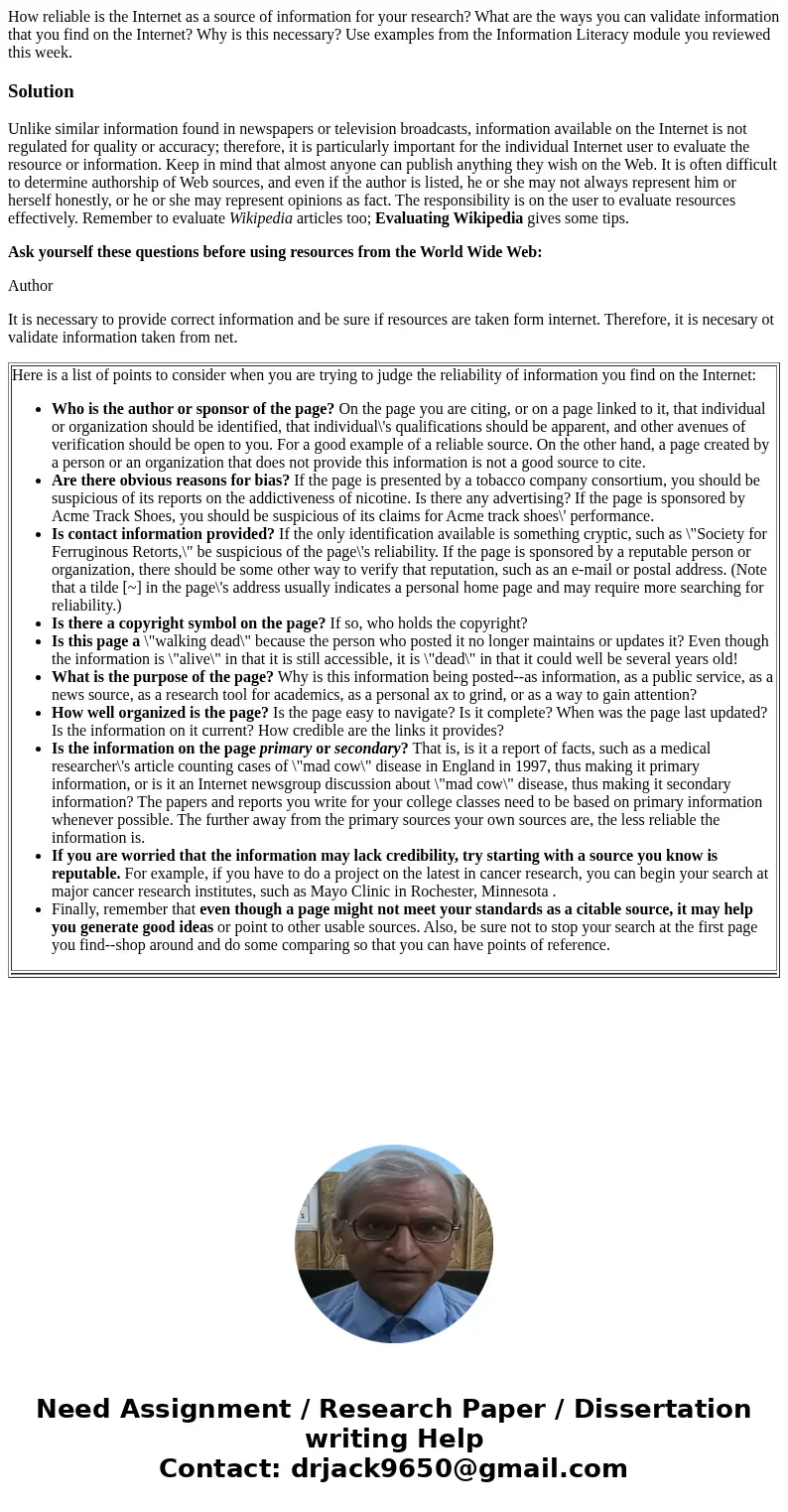How reliable is the Internet as a source of information for your research? What are the ways you can validate information that you find on the Internet? Why is this necessary? Use examples from the Information Literacy module you reviewed this week.
Unlike similar information found in newspapers or television broadcasts, information available on the Internet is not regulated for quality or accuracy; therefore, it is particularly important for the individual Internet user to evaluate the resource or information. Keep in mind that almost anyone can publish anything they wish on the Web. It is often difficult to determine authorship of Web sources, and even if the author is listed, he or she may not always represent him or herself honestly, or he or she may represent opinions as fact. The responsibility is on the user to evaluate resources effectively. Remember to evaluate Wikipedia articles too; Evaluating Wikipedia gives some tips.
Ask yourself these questions before using resources from the World Wide Web:
Author
It is necessary to provide correct information and be sure if resources are taken form internet. Therefore, it is necesary ot validate information taken from net.
Here is a list of points to consider when you are trying to judge the reliability of information you find on the Internet: - Who is the author or sponsor of the page? On the page you are citing, or on a page linked to it, that individual or organization should be identified, that individual\'s qualifications should be apparent, and other avenues of verification should be open to you. For a good example of a reliable source. On the other hand, a page created by a person or an organization that does not provide this information is not a good source to cite.
- Are there obvious reasons for bias? If the page is presented by a tobacco company consortium, you should be suspicious of its reports on the addictiveness of nicotine. Is there any advertising? If the page is sponsored by Acme Track Shoes, you should be suspicious of its claims for Acme track shoes\' performance.
- Is contact information provided? If the only identification available is something cryptic, such as \"Society for Ferruginous Retorts,\" be suspicious of the page\'s reliability. If the page is sponsored by a reputable person or organization, there should be some other way to verify that reputation, such as an e-mail or postal address. (Note that a tilde [~] in the page\'s address usually indicates a personal home page and may require more searching for reliability.)
- Is there a copyright symbol on the page? If so, who holds the copyright?
- Is this page a \"walking dead\" because the person who posted it no longer maintains or updates it? Even though the information is \"alive\" in that it is still accessible, it is \"dead\" in that it could well be several years old!
- What is the purpose of the page? Why is this information being posted--as information, as a public service, as a news source, as a research tool for academics, as a personal ax to grind, or as a way to gain attention?
- How well organized is the page? Is the page easy to navigate? Is it complete? When was the page last updated? Is the information on it current? How credible are the links it provides?
- Is the information on the page primary or secondary? That is, is it a report of facts, such as a medical researcher\'s article counting cases of \"mad cow\" disease in England in 1997, thus making it primary information, or is it an Internet newsgroup discussion about \"mad cow\" disease, thus making it secondary information? The papers and reports you write for your college classes need to be based on primary information whenever possible. The further away from the primary sources your own sources are, the less reliable the information is.
- If you are worried that the information may lack credibility, try starting with a source you know is reputable. For example, if you have to do a project on the latest in cancer research, you can begin your search at major cancer research institutes, such as Mayo Clinic in Rochester, Minnesota .
- Finally, remember that even though a page might not meet your standards as a citable source, it may help you generate good ideas or point to other usable sources. Also, be sure not to stop your search at the first page you find--shop around and do some comparing so that you can have points of reference.
|
|

 Homework Sourse
Homework Sourse